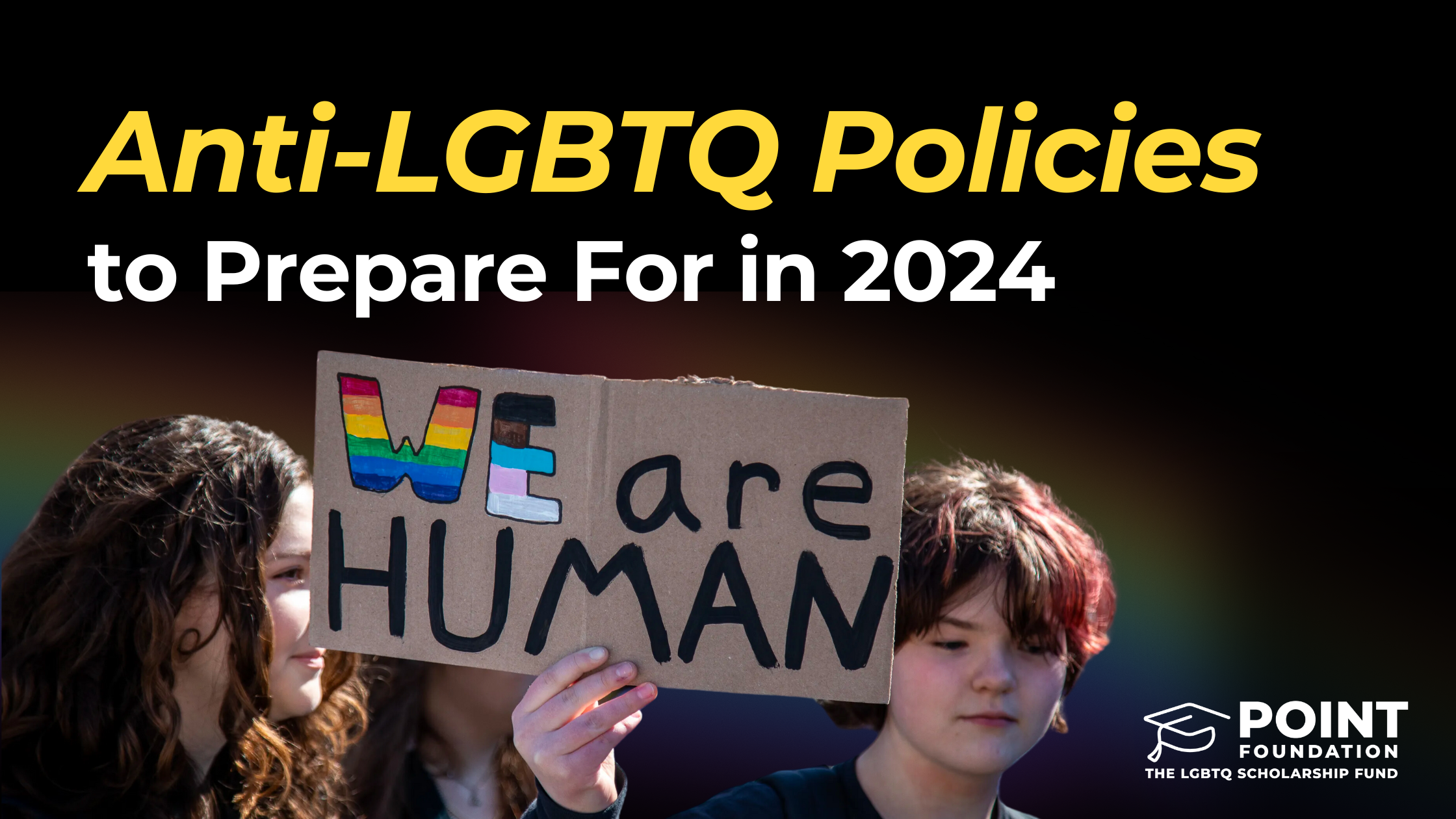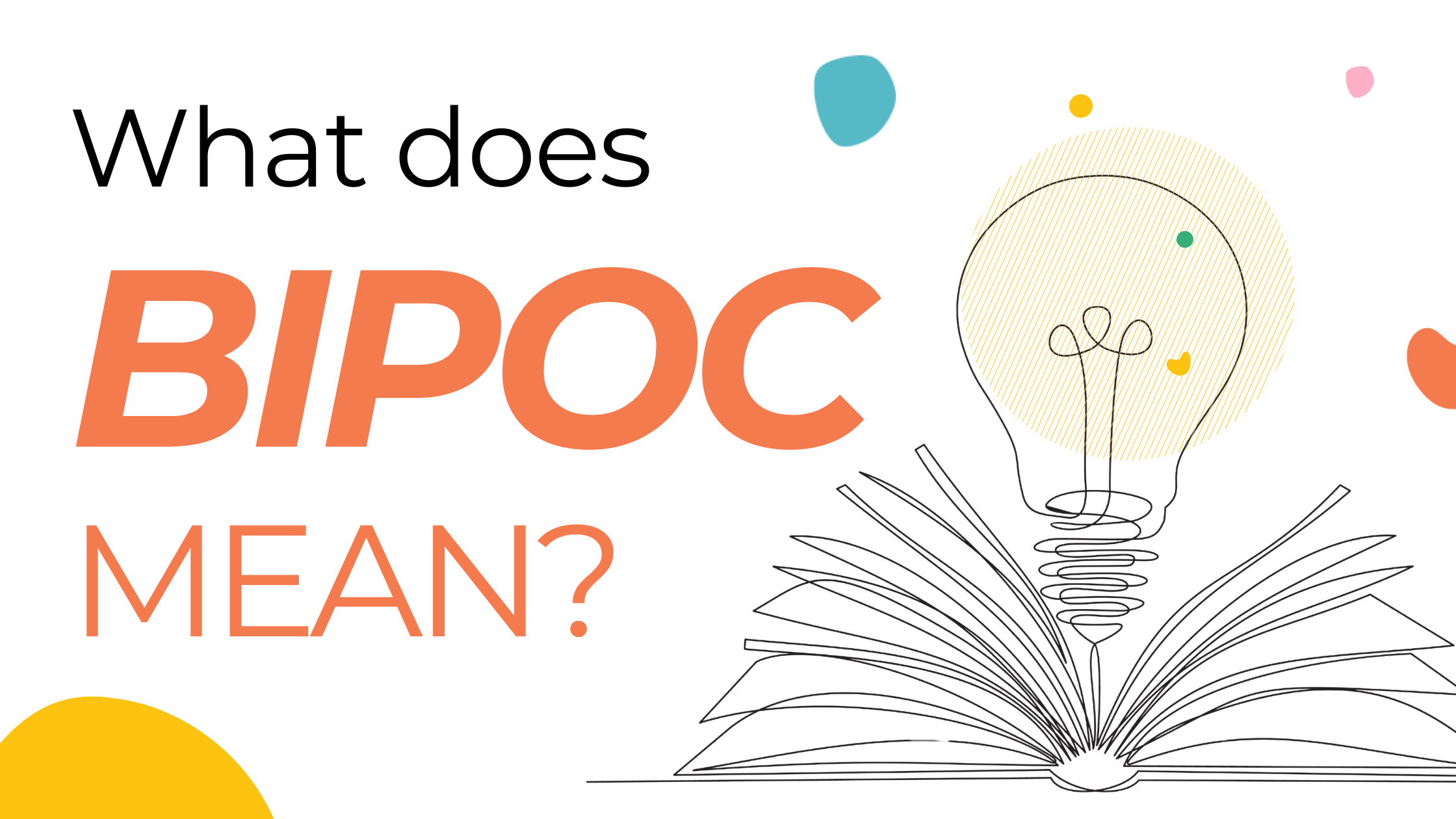Anti-Diversity & Anti-LGBTQ Policies: What It Means for 2024 Elections

As campuses across the country enact the anti-LGBTQ, and anti-Diversity, Equity, and Inclusion (DEI) policies passed in 2023, 2024 surpassed the proposed legislation the year prior with more than 500 proposed anti-LGBTQ bills in state legislatures. So far this year, American legislators have nearly caught up to the total number of anti-LGBTQ bills proposed in the entirety of last year. This means that 2024 will be an even more critical year to support LGBTQ people and causes.
Learn about the trends and what you can do to support LGBTQ students.
 “Again, we find ourselves swept up in a movement determined to deny our identity, our humanity, and our right to live our lives freely,” said Robyn Tomiko (she/they), a Point Foundation Flagship Scholar with a Kevin Hummer Scholarship.
“Again, we find ourselves swept up in a movement determined to deny our identity, our humanity, and our right to live our lives freely,” said Robyn Tomiko (she/they), a Point Foundation Flagship Scholar with a Kevin Hummer Scholarship.
As we prepare for state and national political campaigns and elections, Point and our network of scholars across the United States are already feeling the impact of legislation that affects student services as well as an atmosphere that threatens LGBTQ and culturally diverse students.
 “It's extremely disheartening to witness this change in the American political climate, especially as a person coming into adulthood in what seems to be a hostile, prejudiced world,” said K.S. Jamison (she/her), a Point Flagship Scholar.
“It's extremely disheartening to witness this change in the American political climate, especially as a person coming into adulthood in what seems to be a hostile, prejudiced world,” said K.S. Jamison (she/her), a Point Flagship Scholar.
Anti-DEI Policy Trends
Since 2023, legislators proposed 65 bills that affect or remove DEI efforts on campuses across the US, according to the Chronicle of Education. So far, eight have become law.
Anti-DEI efforts affect employee and program titles and names of departments or physical spaces on campus. These policies also alter academic offerings, removing classes from the available curriculum for students. Some bills alter the faculty and staff hiring policies or student recruitment policies on campuses, stripping the universities, colleges, and schools of practices put in place to address institutional barriers that are based on race, sexual orientation, and gender identity.
Anti-DEI regulations are already affecting LGBTQ students like Fox Ostrowski-Guevara (they/he), a Point Alum in Texas.
 “It feels as though conditions for Texas (and all Southern) queer folk are only getting worse as time goes on,” Fox said. “Queer colleagues of mine, all native Texans like myself, have been evacuating the state as legislation and attitudes become more hostile. My applications to graduate schools on the East and West coasts, hopefully, will be my ticket to flee. I am counting on it.”
“It feels as though conditions for Texas (and all Southern) queer folk are only getting worse as time goes on,” Fox said. “Queer colleagues of mine, all native Texans like myself, have been evacuating the state as legislation and attitudes become more hostile. My applications to graduate schools on the East and West coasts, hopefully, will be my ticket to flee. I am counting on it.”
Senate Bill 17, in Texas, prohibits diversity, equity, and inclusion offices and essential policies at public colleges and universities. This bill followed a previously passed piece of legislation that dismantled DEI programming in k-12 schools as well.
Fellow Texas student Javier Franco (he/him), a Point BIPOC Scholar at the University of Houston, said that the law has already halted essential services on campus that have a life-changing impact on LGBTQ students.
 “In addition to the many resources offered within the [LGBTQ] center and the safe space it created for LGBTQ students like me on campus, it was my initial point of reference to resources geared at LGBTQ students outside of the university,” Javier said. “For example, I discovered the Point Foundation through [the center’s] Instagram account (which has since been deleted) and I fear that future LGBTQ students at the University of Houston won’t have the same access to resources that are vital in succeeding within higher education.”
“In addition to the many resources offered within the [LGBTQ] center and the safe space it created for LGBTQ students like me on campus, it was my initial point of reference to resources geared at LGBTQ students outside of the university,” Javier said. “For example, I discovered the Point Foundation through [the center’s] Instagram account (which has since been deleted) and I fear that future LGBTQ students at the University of Houston won’t have the same access to resources that are vital in succeeding within higher education.”
While there is no single solution to ensuring diversity and inclusion on campus, this anti-DEI effort and political mindset is setting colleges and universities back.
Anti-LGBTQ Policy Rollbacks and Restrictions
While school policies and legislation removed DEI from schools in 2023, 16 states passed anti-LGBT laws that affected the classroom. Schools, largely k-12 institutions, were hit with 29 bills in 2023 that:
- Prohibit students from using the correct bathroom,
- Allow staff to deadname students,
- Stop students from joining sports teams,
- Allow parents to remove classroom materials,
- Forbid staff from discussing gender or sexual orientation, and
- Require employees to out students’ gender or sexuality.
Many of the 228 bills that were proposed in 2023 and failed to pass their committees before the state session ended have already resurfaced in 2024. A total of 154 anti-LGBTQ bills that affect schools are already being considered in Alaska, Arizona, Georgia, Hawaii, Iowa, Kansas, Kentucky, Maine, Maryland, Michigan, Minnesota, Mississippi, Missouri, Nebraska, New Hampshire, New Jersey, New Mexico, North Carolina, Ohio, Oklahoma, Oregon, Pennsylvania, South Carolina, Tennessee, Utah, Vermont, Virginia, Washington, West Virginia, Wisconsin, and Wyoming.
Like Texas Senate Bill 17, many states are extending their existing anti-LGBTQ laws to impact more of their state’s residents, including expanding their policies to affect adults and people in places of higher education.
 “It’s very scary to see this type of legislation slowly spread across the country and creep into the federal level," Jenia Browne, a Point Flagship Scholar with a Walter Decker Scholarship said. "Especially as a Black person who is affected by my positionality as queer and Black, I am worried about the fallout from this legislation as well, as rises in hate crimes and rhetoric often increases alongside them.”
“It’s very scary to see this type of legislation slowly spread across the country and creep into the federal level," Jenia Browne, a Point Flagship Scholar with a Walter Decker Scholarship said. "Especially as a Black person who is affected by my positionality as queer and Black, I am worried about the fallout from this legislation as well, as rises in hate crimes and rhetoric often increases alongside them.”
State anti-LGBTQ policies are met with fears of similarly hateful policies at the federal level. Amidst reports of transphobic agendas and national policy changes or rollbacks, it’s still unclear how the 2024 presidential election will affect LGBTQ students on campuses.
 “The presidential election specifically has had extreme impacts on my mental health and feeling of safety in my own country,” said Warren Small, a Point Flagship Scholar with an Amazon Scholarship.
“The presidential election specifically has had extreme impacts on my mental health and feeling of safety in my own country,” said Warren Small, a Point Flagship Scholar with an Amazon Scholarship.
Anti-LGBTQ and DEI Politics in 2024
As we stand on the cusp of the 2024 elections and legislative sessions, the US already faces more proposed anti-LGBTQ legislation than in 2023. This ongoing attack underscores the urgency of understanding these proposals, as they may shape the national and state political landscapes.
The interplay between policy shifts and elections is undeniable. The bills of the past and present indicate the potential trajectory of LGBTQ and DEI issues in the upcoming elections and sessions.
How You Can Make a Difference in 2024
Point Foundation students speak up about how you can act against anti-LGBTQ and anti-DEI policies on your campuses and in your communities.
For students
- Take action
“Stay involved in politics, both locally and nationally. Don't stick to political hobbyism, engage with the political issues important to you through actively working in your community. Volunteer at non-profits in your area, and vote in local elections. While attempting to change the minds of those on the opposite political spectrum can feel like progress, true progress can only be reached by engaging with people in the real world.” - K.S. Jamison - Speak to family and friends
“Speak to the people that you love, convince them or at least try to get them to understand the stakes of this upcoming election and the impacts it will have on your life. Remember to take care of yourself and build a network of people that you know you can trust.” - Warren Small - Organize
“My advice for LGBTQ students is to find each other. Find your people. Band together. Build a community of connection, care, and support that is impervious to policy, oppressive law, and political will. Create truly safe spaces for your people -- in your living room, in a coffee shop, online, wherever you can. Remind yourself that you are worthy of a liberated life, you are worthy of care and love, you are worthy of the support of allies -- you are worthy to demand such support. Remind yourself that you are not alone. And no matter how bleak the world feels, remind yourself that our ancestors, our predecessors, our fam that came before us fought this fight, and they are all with us, too”. - Robyn Tomiko - Self-care
"My advice is to stay engaged while taking care of yourself. You can only do so much, but I’ve found that being active in my community helps me keep up hope. I think hope is really essential in any movement and without it we have very little to live on. Getting engaged with efforts around you reminds you that there are good people doing good things. In conjunction with that, self-care is vital and radical. Finding ways to stay aware of what’s going on around us without burning out is a hard balance, but it’s achievable." – Jenia Browne
For allies and academics
- Take action
“I think other people advocating for groups that they may not even be a part of is really important in the people who are around me. It doesn’t take a lot to stand up for the people around you in one-to-one or small spaces as well as large ones. Small interactions that change people's minds are more important than we think. I also think supporting students’ mental health and academic paths to make sure we can still graduate on time is vital.” - Jenia Browne
“No matter your reasoning for voting for a candidate, you are voting for all that candidate stands for. You can’t just vote for a specific candidate because you believe they will make the economy more stable without also understanding how that candidate will do terrible harm to vulnerable communities in this country, so with that, I’d ask you to get the people you know that are closest to you to understand the stakes of this year. The same principles can be applied to local and state elections.” – Warren Small
“What would really help me, my friends, my colleagues, and my family is for allies to fight for us, socially and politically. We need allies outside of LGBTQ identity to fight like it's their rights and humanity being stripped. We need allies, especially those in oppressive areas of the country, to be brave. We need their courage. We do matter. We are valuable. We do belong. Taking action to secure these truths in the policy and law of this land is what we need from allies.” – Robyn Tomiko - Listen & learn & amplify
“Simply listen to the concerns expressed by people within marginalized communities and attempt to create solutions to problems they may face. For example, if someone's reporting harassment based on their identity, don't simply ignore it! Address the problem at the root and call out the perpetrator. Emphasize that you/your organization are committed to creating equitable environments, and don't stand for discrimination of any kind.”- K.S. Jamison
As we brace for the 2024 elections and legislative sessions, the recent surge in anti-DEI and anti-LGBTQ policies serves as a stark reminder of the importance of civic engagement. By staying informed, supporting advocacy efforts, and actively participating in the democratic process, we can collectively shape a future that upholds the principles of diversity, equity, and inclusion for all. The policies of today will undoubtedly influence the trajectory of LGBTQ and DEI rights in the elections to come.
Related Posts
November 02, 2023, Point Foundation - The National LGBTQ Scholarship Fund

The Impact of Anti-LGBTQ Legislation in Higher Ed
"Recent legislation just seeks to divide us further. It hopes to prevent so much progress that has...
February 01, 2024, Point Foundation - The National LGBTQ Scholarship Fund

Supporting LGBTQ BIPOC Students
What is BIPOC? BIPOC stands for Black, Indigenous, and people of color. We use this acronym to...
October 22, 2024, Point Foundation - The National LGBTQ Scholarship Fund

LGBTQ Students In Higher Education: Challenges And Support
DOWNLOAD RESOURCE DOWNLOAD ONE PAGER Updated October 2024 LGBTQ students in higher education face...